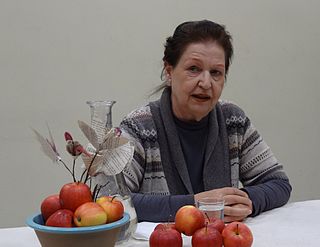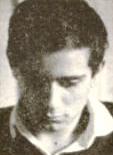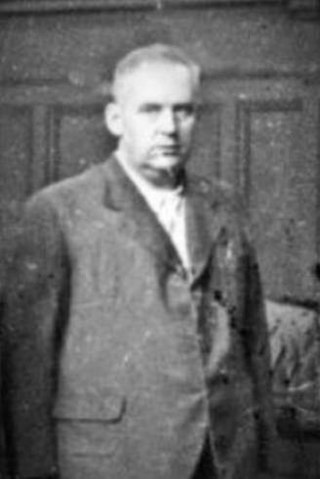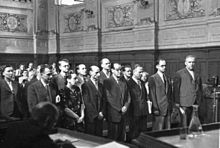
TIGR, an abbreviation for Trst, Istra, Gorica, and Reka, full name Revolutionary Organization of the Julian March T.I.G.R., was a militant anti-fascist and insurgent organization established as a response to the Fascist Italianization of the Slovene and Croat people on part of the former Austro-Hungarian territories that became part of Italy after the First World War, and were known at the time as the Julian March. It is considered one of the first anti-fascist resistance movements in Europe. It was active between 1927 and 1941.

Leon Rupnik, also known as Lav Rupnik or Lev Rupnik was a Slovene general in the Kingdom of Yugoslavia who collaborated with the Fascist Italian and Nazi German occupation forces during World War II. Rupnik served as the President of the Provincial Government of the Nazi-occupied Province of Ljubljana from November 1943 to early May 1945. Between September 1944 and early May 1945, he also served as chief inspector of the Slovene Home Guard, a collaborationist militia, although he did not have any military command until the last month of the war.

Ljubo Sirc CBE was a British-Slovene economist and prominent dissident from Yugoslavia.

Jože Snoj was a Slovenian poet, novelist, journalist and essayist. He was awarded the 2012 Prešeren Award for his lifetime work and rich literary opus.

Alenka Puhar is a Slovenian journalist, author, translator, and historian. In 1982, she wrote a groundbreaking psychohistory-inspired book "The Primal Text of Life" about the 19th century social history of early childhood in Slovene Lands, then part of the Austro-Hungarian Empire. The book was in 2010 the subject of a television documentary that was in 2010 televised on the national RTV Slovenija. Her grandfather was the photographer and inventor Janez Puhar, who invented a process for photography on glass.

Peter Vodopivec is a Slovenian historian and public intellectual.
Katja Boh (1929–2008) was a Slovenian sociologist, diplomat and politician.
Dušan Pirjevec, known by his nom de guerre Ahac, was a Slovenian Partisan, literary historian and philosopher. He was one of the most influential public intellectuals in post–World War II Slovenia.

Pavel Gantar, also known as Pavle Gantar is a Slovenian politician and sociologist. Between 2008 and 2011, he served as speaker of the Slovenian National Assembly. From February 2012 and to their dissolvation in 2015, he has been the president of the social liberal extra-parliamentary party Zares.

Angela Vode was a Slovenian pedagogue, feminist author and human rights activist. An early member of the Communist Party of Yugoslavia, she was expelled from the Party in 1939 because of criticism against the Hitler-Stalin Pact. During World War II, she joined the Liberation Front of the Slovenian People, but was expelled in 1942 because of disagreements with the Communist Party of Slovenia. In 1944, she was interned in a Nazi concentration camp. After the war, she was arrested by the Yugoslav communist authorities, trialed at the Nagode Trial and imprisoned for several years. After her release from prison she was excluded from public life for the rest of her life. In the 1990s, she became one of the foremost symbols of victims of totalitarian repression in Slovenia.

Mitja Ribičič was a Slovenian and Yugoslav communist politician. He was the only Slovenian Prime Minister of Yugoslavia from 1969 to 1971.

Izidor Cankar was a Slovenian author, art historian, diplomat, journalist, translator, and liberal conservative politician. He was one of the most important Slovenian art historians of the first part of the 20th century, and one of the most influential cultural figures in interwar Slovenia.
Boris Furlan was a Slovenian jurist, philosopher of law, translator and liberal politician. During World War II, he worked as a speaker on Radio London, and was known as "London's Slovene voice". He served as a Minister in the Tito–Šubašić coalition government. In 1947, he was convicted by the Yugoslav Communist authorities at the Nagode Trial.

Črtomir Nagode was a Slovenian politician and geologist.

Franc Snoj was a Slovenian politician and economist.
Drago Supančič (1903–1964) was a Slovene special-needs teacher.
The Dachau trials were a group of show trials held between 1947 and 1949 in FPR Yugoslavia, mostly in PR Slovenia. The name refers to the fact that 31 of the defendants had been prisoners at the Dachau concentration camp. Thirty seven people were sentenced, 15 of them to death, 10 of whom were executed. All sentences were reversed in April 1986.
Political prisoners in Yugoslavia were held throughout both systems of government of the former country. Most political prisoners in the Kingdom of Yugoslavia (1918–1941) were communists, whereas the Socialist Federal Republic of Yugoslavia (1945–1992) primarily incarcerated real and alleged Stalinists during and after the Informbiro period, anti-communists, nationalists and dissidents, all of which were perceived as a threat to the system.
The Battle of Grčarice was a battle fought in early September 1943 between the Slovene Partisans and the Blue Guard. The battle was waged in Grčarice in German-occupied Yugoslavia, modern-day Slovenia.












